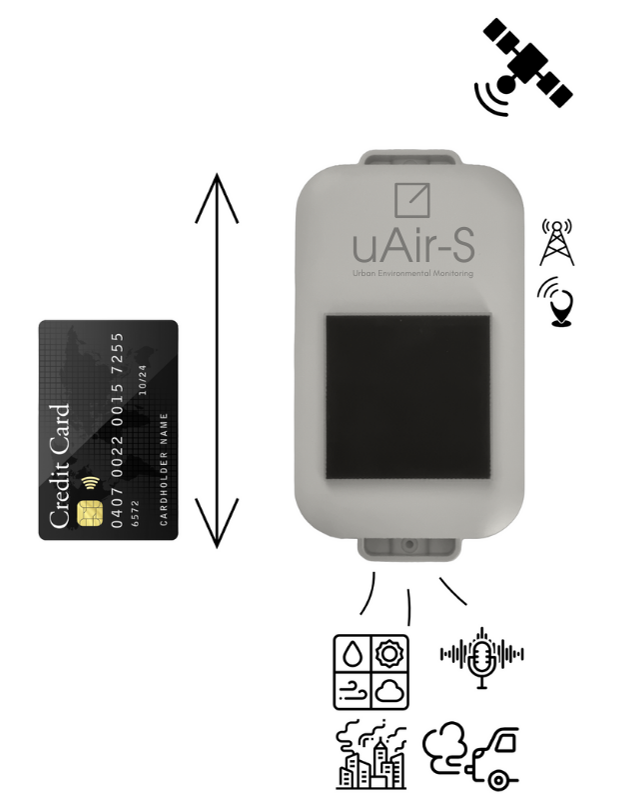
It’s almost impossible not to be aware of the impact of climate change these days. There are stark reminders in the news on almost a daily basis. But would a more local insight into the effects of pollution and its contribution to climate change increase engagement and action from governments and citizens living in these locations? That’s what a new pilot project in Portugal, named uAiR, is hoping to achieve.
Their pioneering IoT device for measuring air quality and noise at a local level is being developed to open people’s eyes to the fact that climate change is not just something that is happening across the other side of the globe. It is a real and urgent issue that is also occurring on their doorstep.
In this blog, we share the details of the uAir project, what this new technology can achieve and how this data can be leveraged to drive action.
A Brief History of Pollution Monitoring
Measuring aspects of our environment, such as air pollution and noise levels, is not a new process. Hippocrates recognised air pollution as a threat to human health in 400 BC! The Industrial Revolution accelerated these concerns, with urban smogs causing thousands of premature deaths. In the UK, the first Clean Air Act was introduced in 1956, with a coordinated air pollution monitoring network set up in 1961 called The National Survey.
Technology has developed alongside our increasing awareness of the effects of pollution, facilitating our understanding of the environment. Building and launching satellites to send data from space is one example of these developments. In 1996, the first pollution-sensing instrument, the Global Ozone Monitoring Experiment (GOME), was launched. With information provided by this remote satellite sensor, scientists could use computer models to understand and predict pollution.
However, many of today’s conventional air quality monitoring solutions can only provide data with resolutions of around 10 km2, which does not enable specific pollution issues to be pinpointed within a city. This lack of local knowledge means that the everyday person, communities, and even governing bodies are quite far removed from this data and thus slow to act to create any positive change.
The Local Focus of the uAir Project
The uAir project is a community initiative launched in Coimbra, Portugal, to increase local environmental awareness through technology. The objectives of the uAir project are to create an environmental measuring IoT device that is easy to deploy, does not require significant maintenance and can send data on a local environment to a centralised location.
By deploying many of these small high-resolution environmental monitoring IoT devices across the city, the uAir project aims to gather large volumes of real-time information on air quality and noise, analysing how varying times of day and factors such as city events impact pollution levels.
The Features of the uAir Device
The uAir device is a compact, low-cost IoT device that is approximately 1.5 times the length of a credit card. It comprises sensor modules – AQI,O3,NO2, Temperature, Humidity and optional PM2.5 – that measure air quality, noise levels, temperature and humidity. The data from these devices will be transmitted in real-time via a LoRaWAN® network server from The Things Network to a centralised cloud-based dashboard. Here, generative AI will enable extensive datasets to be analysed, creating detailed maps and insight into the local urban environmental health.
The uAir IoT device is powered via a built-in high-efficiency solar panel; therefore, no batteries are required. With this energy autonomy, the device has a long life of up to 10 years.
 This project is mainly based in the city of Coimbra, so it relies primarily on terrestrial networks to send data from the IoT devices. However, there are coverage gaps, especially further out of the centre, where terrestrial networks do not reach.
This project is mainly based in the city of Coimbra, so it relies primarily on terrestrial networks to send data from the IoT devices. However, there are coverage gaps, especially further out of the centre, where terrestrial networks do not reach.
To navigate this challenge, the uAIR project developed the uAir-Sat. This version of its device integrates EchoStar Mobile’s EM2050 module, with embedded S-band satellite antenna, and thus enables LoRaWAN® over satellite and terrestrial networks. Using EchoStar Mobile’s geostationary satellite, the uAIR-Sat can access coverage that is reliable and comprehensive in even the most challenging remote environments where terrestrial networks are insufficient or unavailable. The uAir-Sat solution requires no additional infrastructure and can be placed anywhere to monitor air quality.
A Community-Driven Environment-Focused Project
The uAir project is supported by the local municipality in Coimbra via its #CoimbraCityLab mission, which assists the development of sustainable technology-based ideas. The municipality is helping with the project’s implementation, providing locations and support for device installation.
The uAir project has also gained support from the non-profit organisation, COOL—Associação Coimbra Coolectiva. With its goals of engaging and mobilising citizens in promoting sustainability in the Coimbra municipality, COOL is offering support to the project by enhancing community involvement.
Technology Driving Action on a Local Level
The ultimate goal of the uAir project is to evoke local action against pollution, with its IoT devices delivering compelling, localised visibility on the city’s environmental health. The data will be open to all, meaning that not only research labs and partners will have access, but also governments, private companies and citizens.
The project aims for its data to serve as a valuable tool for government action, enabling them to make data-driven decisions on environmental policies and urban planning, particularly air and noise pollution. With the support of its partners, the uAir project also wants to garner support from local communities to raise awareness and promote further action against climate change.
Replicating Local Efforts for Global Impact
Most of the world is seeing climate trends unfold in one form or another. It’s real, and it requires immediate action. The data provided by the uAir project will highlight the effects of pollution on a local level, delivering irrefutable evidence that pollution is not just a problem happening elsewhere. By enabling a collaborative effort, the work of the uAir project should foster significant change within its targeted communities. This project is only in its initial pilot phase. However, if successful, it could be replicated in other areas and municipalities to make a substantial global contribution to climate action.
Partner Acknowledgements
Thank you to our partners and collaborators for their support and expertise in the uAiR Project:
- Antonio Alves, uAir Project and Portugal Online
- #CoimbraCityLab, Coimbra local municipality
- COOL – Associação Coimbra Coolectiva
- The Things Network
- EchoStar Mobile


